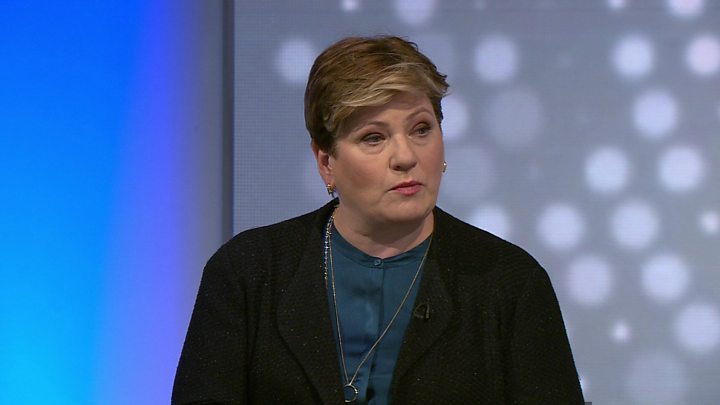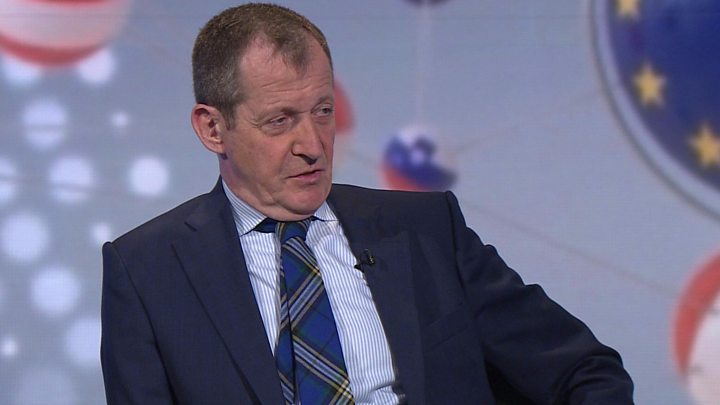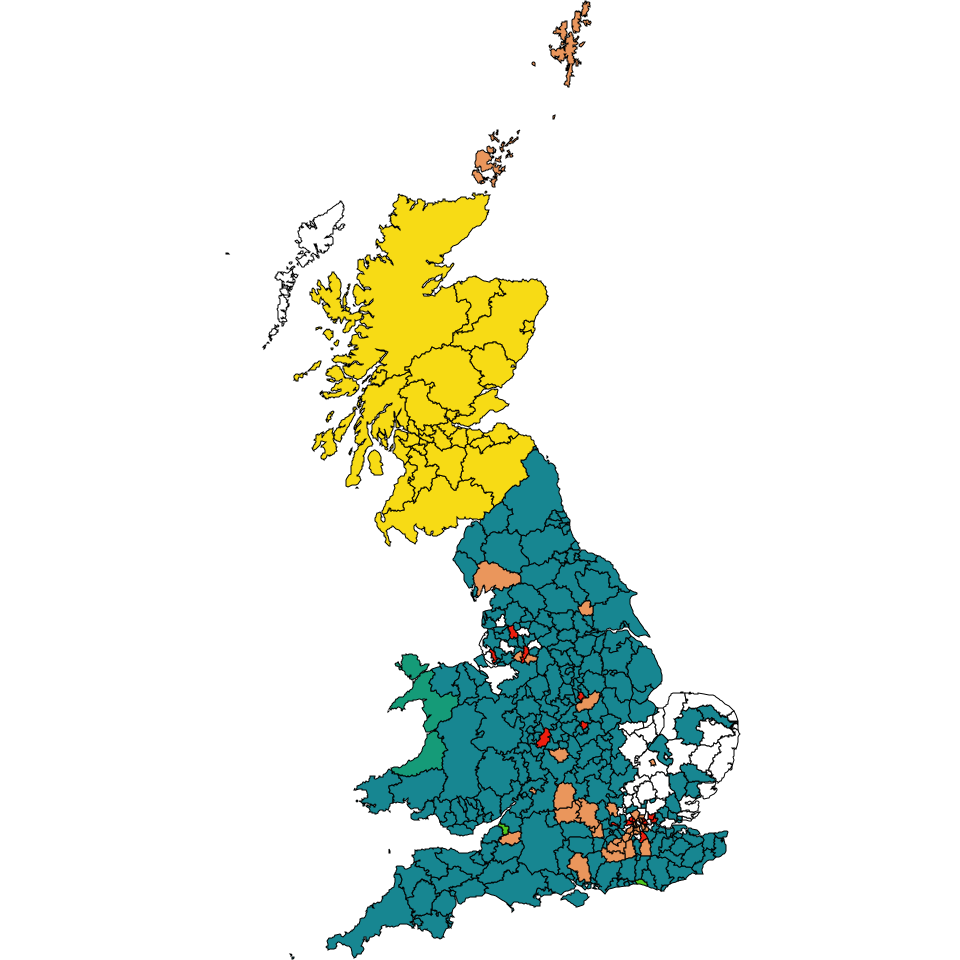The Brexit Party was the clear winner in the UK European election results, with the pro-EU Lib Dems coming second.
The Conservatives and Labour suffered heavy losses, with the former heading for less than 10% of the vote.
Brexit Party leader Nigel Farage said the two main parties “could learn a big message” from the results.
Overall, out of 64 MEPs declared so far, Mr Farage’s party has won 28, the Lib Dems 15, Labour 10, Greens seven, the Tories three and Plaid Cymru one.
All 28 EU member states are electing MEPs. The big centre-right and centre-left blocs in the European Parliament have lost ground, amid a surge in support for liberals, Greens and nationalists.
The UK had been due to leave the EU on 29 March, but when that deadline was missed, participation in the election became mandatory.
- LIVE: UK European election 2019 results
- How does voting work in European elections?
- A really simple guide to the European elections
- The UK’s results in maps and charts
The Brexit Party topped the polls in every region of England apart from London. It also dominated in Wales, with Plaid Cymru second.
Scotland is yet to formally declare, but with most votes counted, the SNP is on course for a resounding victory, with about 38% of the vote.
Meanwhile, Northern Ireland’s count does not begin until Monday, with the results expected on Tuesday.
Polling expert Sir John Curtice said the results showed just how polarised the country had become.
BBC political editor Laura Kuenssberg said it was the worst performance for the Conservatives as a party since 1832.
“If this was a first-past-the-post election, they would not have taken a single seat,” she said.
So far:
- The UK is electing 73 MEPs, and 10 out of 12 regions have declared
- The Brexit Party has received the highest share of the vote in nine of the 10 regions – with 32% overall
- The Conservative Party has been widely rejected by the electorate, coming in fifth place
- The Lib Dems have taken second place with 20% of the vote – a vote that is clearly much higher in areas that backed Remain. In London, the Lib Dems came first and the Tories fifth
- The Green Party has also made gains, seeing its best performance since 1989
- Newly-formed Change UK has not won any seats, while UKIP has also haemorrhaged support to The Brexit Party – both have gained about 3% of the vote
- The Labour Party has fallen to third place overall – fifth in Scotland – and is on course to end up with less than 15% of the vote, an even worse performance than the previous low in 2009
Mr Farage said if the UK did not leave the EU by the new deadline of 31 October, these results would be repeated at a general election.
“Never before in British politics has a party just six weeks old won a national election,” he tweeted.
- Widdecombe elected SW Brexit Party MEP
- Brexit Party tops in West Mids Euro vote
- Brexit Party wins East of England
Brexiteer and Conservative MEP for the South East Daniel Hannan – one of only three Tory MEPs elected so far – told the BBC it was his party’s “worst ever result”.
“We voted to leave (the EU) and we haven’t left – it’s that simple,” he said.
Tory leadership hopeful and former Foreign Secretary Boris Johnson said the public had delivered “a crushing rebuke” to both major parties for failing to deliver Brexit.
Labour leader Jeremy Corbyn placed blame for that failure squarely with the Conservatives, arguing it meant the elections had “become a proxy second referendum”.
He said his party would “reflect on these results on both sides of the Brexit divide” and the issue “will have to go back to the people” through a general election or a public vote.

Labour’s deputy leader Tom Watson said the party needed to “urgently” re-think its Brexit position after the “disastrous” election results.
Alastair Campbell, former spin doctor to Tony Blair and prominent member of the People’s Vote campaign for another referendum, said for the first time in his life he had voted for the Lib Dems.
In contrast to the two biggest parties, smaller ones with an unambiguous message on Brexit were rewarded.
Lib Dem Sir Ed Davey said his party was “leading the Remain vote” and had “an awful lot to be pleased about”.
- Brexit Party wins half Yorkshire Euro seats
- Brexit Party tops European poll in Wales
- Brexit Party takes two North East seats
- SNP ahead in Scotland as Labour vote collapses
Green Party co-leader Sian Berry said the established parties had been rejected “so badly” and the public were “crying out for something new – they’ve seen that in the Green Party”.
She insisted the results were “not a victory” for The Brexit Party as voters had also shown support for Remain parties.
Change UK leader Heidi Allen told the BBC her party – newly formed from ex-Labour and Tory MPs – was “down, but we are not out”.
It’s probably best read as approximating to a draw – between the Remain and Leave sides, that is. (I’m leaving out the nationalists.)
Two parties, both in favour of leaving without a deal overwhelmingly almost entirely supported by Leave voters: The Brexit Party and UKIP. Total vote: 35%
Three parties: the Liberal Democrats, the Greens and Change UK, all in favour of another referendum. Total vote: 35%.
I think the oddest truth is that what this election has done is two things.
One is to demonstrate just how polarised the public are on this issue.
The second is to remind us, as the opinion polls have been telling us, that support for Remain and support for Leave are still very close to each other.
The highest Brexit Party votes were recorded in Castle Point, in Essex, (59%), and Boston (56%) and South Holland (55%), both in Lincolnshire.
The best Lib Dem performances occurred in Gibraltar (77%), Richmond upon Thames (52%) and Kingston upon Thames (47%).
The best Green performances were in Brighton and Hove (36%), Bristol (35%) and Stroud (28%).
Image copyright
PA
Former Conservative Anne Widdecombe has been elected as an MEP in the South West for The Brexit Party
Turnout was just below 37%. That puts it on course to be the second highest in any European election – second only to 2004 when the turnout was partly inflated by the use of all-postal ballots in some parts of England.
Places that voted most strongly to Remain in the referendum saw turnout increase more compared with the last election in 2014 than places which voted most heavily for Leave.

Were these results an overwhelming cry for us to leave the EU whatever the cost? Or a sign, with some slightly convoluted arithmetic, that the country now wants another referendum to stop Brexit all together?
Guess what, the situation is not quite so black and white, whatever you will hear in the coming hours about the meaning of these numbers.
The Brexit Party’s success was significant and his new group is the biggest single winner.
But the Lib Dems, Greens, Plaid and SNP – all parties advocating the opposite – were victors too.
While those two sides fight over this election’s true meaning, what is clear is that the two biggest parties have been damaged by their various contortions over Brexit, punished by the fiasco at Westminster, and beaten by rivals who have offered clarity while they have tried to find nuanced ways through.
There is a chance that encourages both of them to give up fighting for the middle.
UK European elections 2019: Brexit Party dominates as Tories and Labour suffer}


